#code geass mbti challenge
Explore tagged Tumblr posts
Text
Code Geass MBTI Challenge Turn 10: Diethard Ried - ENTP

Turn 10 marks the first time a type is repeated in Code Geass. The first of quite a few in fact, as our list contains almost twice as many characters as there are MBTI types (not to say that every type will be represented by the same number of people). What this means, however, is that I now have the opportunity to show you just how varying people can be even when they are typed as the same. This mainly depends on such things as ho well developed/healthy the person in question is as well as factors that have subjective importance to their personality and upbringing. Diethard Ried is a very good example of this principle, specifically in contrast to our previous ENTP representative - Milly Ashford. Before I start explaining this character’s functions, please keep in mind, that this post will contain heavy Code Geass spoilers, so consider yourself warned. With that out of the way, let us analyse why Diethard Ried is an ENTP.
Dominant Extroverted Intuition/Ne

Appropriately to his dominant function being extroverted and perceiving, Diethard himself sees his single purpose in life as that of an observer, being motivated by a strong desire to personally witness the most amazing and historically impactful events he can get to. For this very reason he joined Lelouch and later Schneizel, both of whom allowed him to be a part of plans that severely changed the world. On the surface Diethard’s obsession with being where the action’s at may appear as dominant Se, however there are some key differences to consider here. Unlike for a Se-dom, his excitement comes not from the experiences themselves, but rather from how the people he follows actually accomplish things that seem nearly impossible to him. For a person with a dominant intuitive function nothing seems quite as interesting as basically seeing literal fantasies and thought experiments being put into reality. This is why Diethard doesn’t mind getting involved in the wars he wants to record: when what you care the most about is creating a great story, objectivity truly may be a myth for some.
The extroverted component of Diethard’s dominant function can be seen in how the plans he wants to see carried out have no personal significance to him. There is no benefit to be gained for him, no need to reflect on the his or Lelouch’s reason for doing what they’re doing, hell, he doesn’t even come up with the plans and does whatever work he is assigned, no matter how amoral. The sole impressiveness of Lelouch’s and Schneizel’s plans are enough to keep him motivated. Notably, Diethard’s admiration for both of his leaders comes from what they can do, not just how smart they are. Clovis was smart too and very skilled at manipulating Japan’s population to maintain a status quo. What he was not is a genius who had both the will and ability to change the world into something never before seen, and that is why Diethard was bored serving under him.
Because Ne is a function based on associative thinking and connections, Ne-doms more often rely on their thinking skills rather than their knowledge of any particular subject, and recognising Diethard’s intellect, Lelouch made him a high ranking officer, despite him being a Britannian who is generally disliked by the rest of the Black Knights. Lelouch was later proven right in his assessment of the journalist, as Diethard has shown a gret ability to think for himself when unable to turn to his leader for guidance. As a result he is one of the few Black Knights to avoid imprisonment at the start of R2 and eventually ends up betraying his master, making Lelouch’s path to victory that much more difficult.
Auxiliary Introverted Thinking/Ti
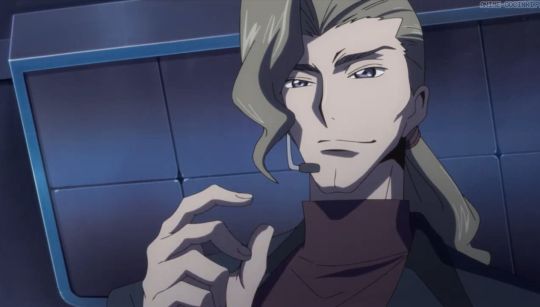
Diethard’s Ti is expressed in several ways. For one, it makes him a skilled journalist, who is not only good at his job, but also has a deep enough understanding of his skills to be able to use them for his new position as an intelligence officer. Even more interesting is the fact that journalism was basically the only thing Diethard was passionate about before he joined the Black Knights, so it is only fitting that he adapted some of the job’s principles as a kind of personal philosophy: all is well that makes for a good story, consequences be damned. The reason for why Diethard’s Ti is not dominant, however, is that his passion for journalism is not his core motivation throughout the series, but a way for him to support his Ne ambitions. In fact, he has no second thoughts about abandoning some essential journalistic standards when he views them as an obstacle, his belief that objectivity is a myth is a perfect example of that. This also shows that Diethard’s views regarding journalism are affected by Britannian society, which also doesn’t shy away from fabricating stories in media. Knowing that, we can conclude that this is an example of Diethard’s Fe affecting his Ti judgements, which also shows that his Fe is tertiary and his Ti - auxiliary.
Much like with Milly, Diethard’s Ti gives him an experimental side, and this is seen in how he likes to challenge the beliefs of fellow Black Knights and question the validity of their views. Ti’s situational/subjective logic is a double-edged sword when it comes to these arguments: Diethard notably tends to debate against morally driven characters, specifically Tohdoh and Ohgi (it’s no coincidence that an ENTP and an ISFJ have so much trouble cooperating), showing the ability to deconstruct their arguments by selecting relevant facts. However, this also shows a level of bias, as we can see when the team loses Zero and needs to decide what to do. While Diethard makes some reasonable arguments in favour of looking for Zero, he ignores the dozens of lives at stake, because they don’t matter to him personally. He knows that without Zero he would have no interest in helping the Black Knights, so he skews the argument to make himself appear more right than he actually is.
Tertiary Extroverted Feeling/Fe

Diethard is a classic example of how ENTPs (specifically in fiction) tend to handle tertiary Fe. While he has a good understanding of social rules and obligations and and the ability to often use them to his advantage, he lacks any kind of personal investment in such things and usually sees them as a means to an end. We can see evidence of this at the start of the series, when Diethard was still working for Clovis: his ability to manipulate media in a way that made Area 11 appear like peaceful utopia and pacified its citizens gave him a high position and a considerable amount of influence in Britannian society, yet he found himself bored and ditched his privileges as soon as he found something more interesting to do. This is even communicated in his character design: despite spending a lot of time in the company of the highest members of Britannian society, Diethard prefers an attire that can be describe as plain at practical at best - fully committing to his social circle is something he considers a waste of his time.
Tertiary Fe happens to be the first major point of difference between Diethard and Milly Ashford. Milly is a healthier ENTP, who, while independent, was still influenced by her upbringing and social environment enough to develop a healthy level of compassion, morality and genuine investment in the lives of her friends - it’s what helps her listen to them and eventually see her own flaws. And then there is Diethard. While we don’t know anything about his life prior to the events of R1, he certainly also seems to be a product of his society, but in a completely different way. In a political system that promotes amoral and manipulative methods, Diethard too has absorbed these values when it comes to achieving his goals, even if he has no interest in the system itself. This makes him only use his Fe to satisfy the urges of his dominant Ne (loop) instead of using it to learn from others or make meaningful connections with them. In this sense, Diethard can be considered a foil to Milly, having many similarities, but some crucial differences from one another..
Inferior Introverted Sensing/Si

As the embodiment of any person’s main flaws and weaknesses, the inferior function is often used to give characters an arc, something they would need to overcome. Both Diethard and Milly possess the same inferior function and hence their inherent flaws are similar, but only Milly learns to be a better person in the end.
Ne is a function that is concerned with theoretical connections between facts. It is therefore directly opposed to Si - a function that focuses on the facts themselves and how they are relevant to the function’s user. For characters with inferior Si, such as Diethard, this means that they focus too much on the external and end up lacking substance or a clear identity as people. This isn’t immediately obvious for Diethard, because he is neither aware, nor cares much about his flaws, but it becomes much more apparent as time goes on. Note that throughout the whole series Diethard has not made any meaningful connections with anyone or anything; he is so obsessed with what he wants to see Lelouch do that he is not even remotely concerned with making others trust him or developing any attachment to even his work, making him the amoral cynic that we all know. And while Milly’s more healthy use of her functions allowed her to find herself and lead a much happier life, Diethard only realised what he was lacking in his final moments.
While he did everything to satisfy his Ne desires and was effective in his service, he failed to earn anyone’s trust or respect as a human being, so when it came to his death, even Lelouch did not see it as worth his effort to show Diethard a last act of kindness.
However, please keep in mind that this is only my opinion on the matter and I will welcome any criticisms or alternative opinions to discuss them. If this article was interesting for you, stay prepared for next time, when I shall discuss the MBTI type of Jeremiah Gottwald.
#mbti#code geass#code geass mbti challenge#Diethard#Diethard Ried#ENTP#Ne#Ti#Fe#Si#fictional characters
62 notes
·
View notes
Text
MBTI’ing the OTP: Anime Edition
mysterylover123
I did a presentation on Funky MBTI on the MBTI’s of my ships. Since Charity doesn’t allow Anime, however, I’ll need to do a separate post for my Anime OTP’s. Basically, for Valentine’s Day I’m writing about the MBTI types of my favorite pairings and how they match up. And of course, as always, these are just my ships; don’t like, that’s fine. It’s all opinion. So here we go: Anime Edition
Fullmetal Alchemist Edward/Winry INTJ/ESFJ

EdWin is an unusual ship for me, as I usually pick pairings that have at least one function in common. Edward & Winry are opposites but boy do they ever attract. He’s a forward-looking, logical and occasionally insensitive genius; she’s a brainy, caring and emotionally savvy engineer. They’re childhood friends who bicker and banter a lot, and are pretty much perfect for one another in every way.
Code Geass: Suzaku/Lelouch: INFJ/INTJ

Suzalulu might be my favorite Slash pair of all time. I’ve never shipped anything so quickly. Childhood friends turned rivals and perfect foils. I haven’t officially typed Suzaku yet for myself, so I’m a little uncertain of his type here. But I could see them both as Ni doms - forward thinking, intuitive and impossibly stubborn. They have different attitudes towards morality - Suzaku conforms his ideals to fit more with situations and Lelouch obeys something from within more. But both have so many plans in common, and I just wish they could’ve cooperated sooner.
My Hero Academia: Katsuki/Izuku - ESFP/ISFJ

I have so many HeroAca ships I could rant about them for hours. I’m picking Katsudeku to talk about here because it’s my favorite, though. I always come back to this one, no matter what other fun pairings the series teases. They have contrasting functions, but similar orders for them. ISFJ/ESFP is a relatively frequent romantic match in fiction. Both sensing dominants, primarily emotionally driven, with tertiary thinking functions. They have such a similar approach towards life in that regard, yet one that’s also opposite. Perfect for foil/rival characters.
Dragon Ball Z: Goku/Chi Chi (ISFP & ESFJ)

Fairly similar MBTI makeup to my last one - SP and SJ, inverted functions. These two are emotionally dominant, Fi and Fe, with sensing functions to follow. Like pretty much all of my anime OTPs, these two get a lot of shit from the fanbase. I don’t have any logical reason why I like them, I just do. They’re such a weird mix but damn if I don’t melt when they get engaged in the ring of the World Martial Arts tournament or reunite after one of their countless death-related separations. Also they’re cute together and socially awkward. My kind of couple.
Death Note: Lawlight (L and Light) INTP & INTJ

I’ve only seen a couple of INTP/INTJ combos as pairings, but there’s definitely an intellectual electricity to this type of combo. Lawlight is that classic dark anime rivalslash pairing, one that’s a strange tragic mixed in with the intellectual challenge of archnemeses. The Holmes and Moriarty dynamic. L is easily one of my favorite anime characters and his dynamic with Light is very much the heart and soul of Death Note. It’s also the only pairing I’ve ever written fanfic about, so obviously it just grabs me.
Neon Genesis Evangelion: Kaworu/Shinji - ENFJ/ISFJ

Kawoshin is one of my favorite canon slash pairings - it’s a tragic one, but there’s just this electric chemistry that comes on screen whenever Kaworu appears. It’s my favorite thing about Eva, the plot twist of Kaworu’s nature. Both characters are high Fe and as such connect really well verbally; they fuss about one another a lot and aren’t shy with the compliments. Shine is naturally more cautious, Kaworu a more philosophical big picture thinker. Lends their dialogue a certain poetry.
Naruto: Naruto Uzumaki/Sakura Haruno (ENFP/ESFJ)

This is my most recent one. It took me a while, but I fell in love with these two. MBTI-wise: ESFJ and ENFP share the same NS functions - Ne/Si, just in different orders. An Ne-dom can help ESFJ loosen up a bit; while higher Si can help ENFP be more responsible. Fe dom and Fi-aux can help each other too, with the Fe’s emotionally supportive and caring nature helping the Fi open up and feel comfortable, while the Fi’s stoicism helps the Fe feel reasured. We see this in their good friendship and strong supportive bond. I am so devastated these two don’t get together, ya’ll don’t even know.
#mbti#otp#anime mbti#Fullmetal Alchemist#death note#code geass#Dragon Ball Z#my hero academia#neon genesis evangelion#edwin#lawlight#suzalulu#gochi#katsudeku#kawoshin#naruto#NaruSaku
112 notes
·
View notes
Text
Code Geass MBTI Challenge Turn 9: Kyoshiro Tohdoh - ISTJ

With the exception of Anya and a few members of the Akito the Exiled cast, Kyoshiro Tohdoh is the character on our list with probably the least amount of information about his personal thoughts, views and experiences. With that in mind, I still think that the show gives us just enough of a glimpse into his personality in order to be able to type him accurately, to the point where I actually had to retype him a few times and overall was given more to think about than I originally expected. Before I start explaining this character’s functions, please keep in mind, that this post will contain heavy Code Geass spoilers, so consider yourselves warned. With that out of the way, let us analyse why Kyoshiro Tohdoh is an ISTJ.
Dominant Introverted Sensing/Si

Tohdoh’s Si is actually very comparable to Ohgi’s, because they value very similar things, but diverge in what further conclusions they do with those values based on their auxiliary and tertiary functions (this is coincidentally perhaps the best opportunity we will ever have to compare an ISFJ to an ISTJ). Much like Ohgi, Tohdoh largely bases his values around Japanese tradition, however he does not see them as something to be explored and shared with others (Ti and Fe), so mach as he uses it to dictate the rules he wants to see himself and his surrounding world world to develop in accordance with (Fi and Te). This sometimes makes him appear much more narrow-minded than he actually is, simply because he has a very specific idea of what he wants to achieve for Japan and for himself and is very determined to make it a reality. In truth he is actually very capable of applying this personal system of principles to others, which is what makes him a competent teacher and role model for Suzaku.
A common trait of dominant Si-users in fiction is that they can be both idealistic and practical in their mindset, with Si being tied to tangible evidence and facts by being a sensing function, while also being introverted and therefore highly subjective and personal to the user. Tohdoh himself embodies this balance quite well: we often see him talk in ways that are sentimental, with topics like honour and his hopes and fears for Japan’s distant future being brought up a lot, but, as Zero mentions during his prison break-in in R1, all of Tohdoh’s legendary success comes down to careful planning and intelligence work. In fact, it seems that Tohdoh himself understands this very well, as we never really see him refer to his work as “miracles” in a non-ironic manner, despite being seen as such by his followers. At his core Tohdoh still very much prefers to deal with factual details, planning out his operations and insisting on taking part in them personally, solidifying him as both a skilled and passionate tactician and leader, and, much like with Ohgi, this is the potential that Lelouch sees in him.
Auxiliary Extroverted Thinking/Te

As stated above, Tohdoh’s success as a leader mainly comes down to methodical and meticulous work combined with a fairly tactical mindset. His Te is certainly an important component of this, as we see him rely on it when he has to step out of his Si comfort zone. We see several examples of this happening when Tohdoh doesn’t see an obvious answer to a problem: his usual response is to trust in Zero’s judgement even if he has to blindly follow orders without a clear understanding of what his leader is planning. This demonstrates a healthy use of auxiliary Te, as it shows his willingness to abandon his immediate instinct to systematically observe the situation by himself (Si) when there is clearly no point in doing that, instead going with a more conventionally rational Te approach and trusting Lelouch because he has proven to be effective in the past. This is both supported and kept in check by his Fi, which gives him a degree of confidence in his judge of other people’s character as well as stops him from being a blindly devoted follower with no clear direction of his own. Compare this to Ohgi, who trusts others (Zero in this example) based on his perception of their sense of morality and trustworthiness (Fe), while his tertiary Ti balances this notion out by making him question his own judgement and thinking of the benefits of a given decision that is independent of ethical questions.
To put it in a somewhat simplified manner, Te is a form of generalist logic, developing a systematic “one size fits all” way of looking at a problem for the user, as they mature. The higher Te is in the functional stack, the more its logical system is complex and willing to account for exceptions, meaning that the kind of over-generalising behaviour that Te-users are often stereotyped for is much more commonly seen in unhealthy, immature or low (in terms of the stack) users. A much more healthy use of Te is comparatively rare in fiction or isn’t recognised nearly as often, however Tohdoh’s tactical ability and respect for authority provide good examples. Neither of the two are things he carries out blindly or out of principle, in fact he demonstrates a high degree of autonomy when deciding to trust his comrades and his superiors - instead these choices come from an understanding that this kind of trust the most reasonable course of action in most difficult situations.
As a soldier these qualities make Tohdoh outstanding.
Tertiary Introverted Feeling/Fi

Tohdoh’s Fi comes out in most of his unhealthier moments, meaning that he enters a Si-Fi loop. Whenever he finds himself in a difficult situation with no apparent solutions provided by his first two functions and nobody else to follow, Tohdoh is prone to giving up all hope and surrendering to his fate. The excuse he uses to justify this is also very evident of an unhealthy use of Fi: in his mind he chooses death to preserve his honour and deserves his fate for his personal failure. With Fi being a function that focuses on very personal values, this is an example of using it defensively instead of finding the inner strength to maintain hope and readiness for an opportunity to improve the situation. This almost causes him to reject a chance of freedom that Zero is basically handing to him in R1. It usually takes an external perspective (Te) such as Zero’s or that of his fellow Holy Swords pilots to “snap him out of” this internally focused state and show him that he can still find a reason to continue fighting without sacrificing his life and that his honour is not compromised by such a choice.
On a somewhat healthier note, Fi also puts an interesting spin on the direction of Tohdoh’s dominant function, giving him a firm belief that a person should keep true to their goals and principles no matter the cost. This is why his initial disappointment in Suzaku disappears to a large degree, when he learns that his former student’s life choices are in full accordance with the ideals he holds. While he still sees Suzaku as an enemy, Tohdoh develops a respect for his willingness to follow the path he chose despite being seen as a traitor to the Japanese by almost everyone and even encourages him to continue. While his Fi isn’t high enough in his stack to make relating to others necessarily easy, it does give him the ability to readily acknowledge that there are subjectively justifiable reasons behind everyone’s actions, no matter how different the person in question may be from himself.
Inferior Extroverted Intuition/Ne

Tohdoh does not get as much screen time or opportunities to speak as some of the other characters on our list, however because of his brutal honesty and overall being based on a fairly common fictional archetype, it isn’t very difficult to understand his fears and weaknesses as a human being. Dominant Si is a function rooted in personal experiences and principles (both moral and logical) that are very personal to the user and allow them to find a place for themselves in the world they inhabit. A common way for inferior Ne to oppose this is the fear of loss of one’s self and the personal principles that make us who we are. This makes Tohdoh reluctant to make decisions that contradicts his ideas about the kind of person he should be and the ways in which he should act. This kind of insecurity provides an understandable explanation for his Si-Fi loops: trying to avoid execution to him is similar to refusing punishment for his failure to liberate Japan, and that would go against his understanding of what he should stand for. This is why he only agrees to escape his prison when offered a chance of redemption.
On a more general scale, inferior Fi makes it hard for Tohdoh to truly understand other people’s motivations and plans when he doesn’t see the evidence leading up to them. Given that Lelouch is Ni-dominant and hence much more willing to rely on theoretical approximations and calculated risks rather than playing it safe and going with the facts, this tends to happen often and Tohdoh is often left having to trust in his leader’s competence without actually knowing what he is up to. Being mature and relatively healthy, however, Tohdoh does not tend to be bothered by this too much, recognising when his life is in capable hands instead of giving in to a fear of uncertainty, as unhealthy or immature Si-doms can often do.
However, please keep in mind that this is only my opinion on the matter and I will welcome any criticisms or alternative opinions to discuss them. If this article was interesting for you, stay prepared for next time, when I shall discuss the MBTI type of Diethard Ried.
#mbti#code geass#code geass mbti challenge#Kyoshiro#Kyoshiro Tohdoh#ISTJ#Si#Te#Fi#Ne#fictional characters
13 notes
·
View notes
Text
Code Geass MBTI Challenge Turn 6: Rolo Lamperouge - ISTP

While he is commonly seen as a controversial character, Rolo Lamperouge has always been one of my personal favourites in the show because of the amount of development he makes as a person (much like Jeremiah) in the relatively short screen time given to him and the kind of life he was forced to lead. And while he still remains unhealthy in the end, I still think that his character arc is very interesting to explore and that it provides a fresh perspective on the otherwise heavily-stereotyped-to-be-a-craftsman ISTP type. Before I start explaining this character’s functions, please keep in mind, that this post will contain heavy Code Geass spoilers, so consider yourself warned. With that out of the way, let us analyse why Rolo Lamperouge is an ISTP.
Dominant Introverted Thinking/Ti
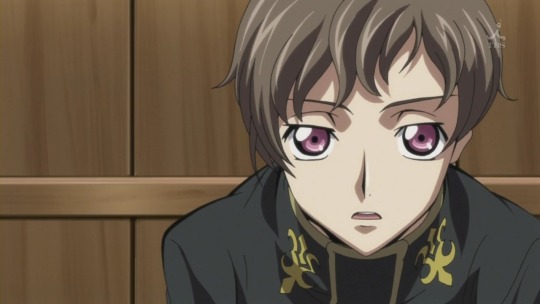
Considering that we just finished analysing Nina, this would be a good opportunity to compare the thinking mechanisms of INTP and ISTP, as both use Ti as their dominant, yet in slightly different ways due to their auxiliary and tertiary function influencing them. We can see that, much like with Nina, Rolo’s logic is very situational and based on experience: having been trained as an assassin and an assassin only since early childhood, he is an expert in his field of work and almost nothing else. He does not comprehend the aspects of life that have little to do with whatever his Ti is currently involved in. This is a bit of an extreme example of how dominant Ti works, but it’s also good at highlighting the kind of specialist mindset that comes with this function and how far it can go for underdeveloped Ti-doms.
We see that Rolo has a strong focus on whatever his current mission may be, approaching each assignment on a case-by-case basis - he basically adapts to the “logic” needed for every job he has to carry out without really relying on previously established logical systems, like a Te-dom would. The most noticeable example of this is how well he manages to play the part of Lelouch’s brother despite never having a family of his own and hence any experience at naturally acting as someone’s family member.
At the same time Rolo bases his judgements on personal experience and is most comfortable with sticking to the methods he’s more skilled in. Because he is a rather underdeveloped ISTP however, this often leads to him making harmful decisions, as his basic response to any potential threat is to murder it as quickly as possible, especially later on in the series when his motivation becomes the protection of his new brother. It is also important to note that Rolo only really starts to develop once his Ti is used in a way that is meaningful to him, which is exactly why it was so easy for him to defect to Lelouch’s side: using dominant Ti in favour of one’s passions or interests is key to using it healthily.
Auxiliary Extroverted Sensing/Se

Rolo is a very practically-minded person and deals only in what he considers to be observable or factually proven, showing early on that he doesn’t like to leave things up to chance, which is why he always tries to finish his missions as quickly and efficiently as possible, as seen by his reluctance to let Lelouch live after cornering him. Even with the possibility of Lelouch drawing out C.C. letting him go seems like too much of a gamble for him and it takes a lot of convincing on Lelouch’s part before Rolo decides to take his bait.
Rolo’s Se also contributes to how he treats his missions, preferring to be personally involved in all important matters (instead of relying on others) and to primarily focus on short-term concerns, making him good at improvising in unexpected situations (this kind of skill does not necessarily apply to all high Se users, however it can occur due to Se’s nature as a function with a focus on the present).
However, while Rolo uses his auxiliary function to aid him practically, he has not developed it in a way that would support his personal growth (the development of the auxiliary function is key to the maturity of a person of any type). Perhaps mostly due to his “upbringing” as an assassin he does not use it to see what kind of activities/sensory involvement he actually enjoys doing or finds meaning in, instead only applying it in a very limited way to accomplish goals, which he has no stake in, even considering his own life to be expendable and claiming that it does not need to contain any meaning. Only after he joins Lelouch does Rolo actually understand that protecting his brother is what gives his life purpose (a concept that is still flawed due to how unhealthy he is, but still better than what he started with), which fills him with motivation and loyalty and even allows him to die a happy, albeit delusional, death.
Tertiary Introverted Intuition/Ni

Throughout all of Code Geass Rolo can be seen having an unhealthy relationship with his tertiary Ni (although the views supporting that relationship and even its very nature change dramatically), which again can mostly be traced back to the kind of brainwashing he was probably subjected to as a child by the Geass Order. Ni is a function that deals with ideological organisation (as in organisation of ideas and not necessarily ideologies), introspection and meaning. The latter is especially important in Rolo’s case, as for most of his life he had been convinced that it doesn’t have any worth and doesn’t need to have any meaning. He believes that he can simply exist by blindly following orders without once asking himself why he does what he does, even comparing his assassination jobs to “brushing his teeth”. At that point he is effectively ignoring his Ni.
Lelouch, however, forces Rolo to confront his tertiary function, by promising him the purpose that he never knew he needed. When Lelouch “sacrifices” himself to save Rolo’s life, the boy doesn’t have a choice but to question where he belongs and whether he should start thinking for himself. We can actually see him panicking, because the simple life he was used to has essentially been exposed as a lie that is falling apart in front of his eyes, which leaves a permanent change in his personality.
But this kind of sudden burst of introspection soon backfires, as Rolo switches from underusing his Ni to overusing it (looping). Given that a tertiary function performs worse than, say, a dominant or auxiliary would, this kind of thinking leaves Rolo with a very simplified picture: his purpose in life now is being Lelouch’s little brother and he is willing to sacrifice anything to fulfil it, leading to several tragic mistake on his part (more about that below). Rolo’s transformation is a very good example of how easily ignoring your tertiary function can eventually result in looping and other kinds of unhealthy thinking.
Inferior Extroverted Feeling/Fe
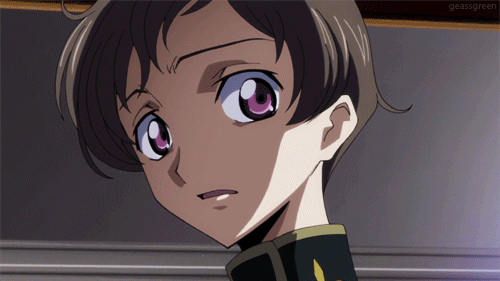
Having been raised by the Geass Order, Rolo never had a family, and hence any kind of social values or needs in him have been repressed very early on in order to effectively create a perfect killing machine. However, Rolo is still a human, and this kind of severe social deprivation has neither left his mind in good health, nor has it erased his actual need for any kind of social interaction.
Before his change we see that Rolo heavily avoids any actions that would lead him to cooperate with others, sacrificing the people he works with for the good of the mission without thinking twice about it. He rationalises these kinds of actions as being the most efficient and reliable way to complete a task, but in actuality this gives away a hidden insecurity - Rolo simply does not know how to deal with other people or even try to convince them of anything and the possibility of doing so elicits fear in him.
Because the inferior function is the one people have the least control over, having inferior Fe means that the user has low awareness and/or control over their social needs and that they may run into problems when dealing with societal norms and ethics (that’s not to say that Ti-doms are amoral, but a universal moral system can be difficult for them to deal with). Rolo checks all of these boxes, first convincing himself about not needing any kind of social aspect in his life and later, when he’s offered the opportunity to actually be part of a family, entering a Fe-grip and serving this new family unconditionally without understanding that his thinking is unhealthy for him. Even when he feels happy and is serving Lelouch, he’s constantly suspicious and afraid of losing his brother, which causes him to overreact on several occasions, causing the death of Shirley and almost killing Lelouch’s actual sister.
While he ends up dying with a smile on his face, Rolo was ultimately unhealthy for his entire life, following people who only looked to use him as a tool in their plans and never letting him grow as a person (both the Geass Order and Lelouch end up suffering for these decisions). In terms of MBTI his story is one that shows the importance of not neglecting one’s lower functions, as doing so will likely result in overindulging in them later.
However, please keep in mind that this is only my opinion on the matter and I will welcome any criticisms or alternative opinions to discuss them. If this article was interesting for you, stay prepared for next time, when I shall discuss the MBTI type of Kallen Kōzuki.
#mbti#code geass#code geass mbti challenge#Rolo#Rolo Lamperouge#ISTP#Ti#Se#Ni#Fe#fictional characters
38 notes
·
View notes
Text
Code Geass MBTI Challenge Turn 7: Kallen Kōzuki - ESFP

The last member of the Ashford Academy group and the first member of the Black Knights that we are analysing, Kallen Kōzuki plays quite an important role in the story of Code Geass: being the simple fighter for her fellow people’s rights surrounded by scheming masterminds and twisted murderers, she represents, to a degree, the perspective of the audience when looking at the thoughts and actions of the rest of the colourful CG cast. She is also the first of several Se-doms, that we are going to take a look at (turns out Code Geass has quite a few of those, which really just goes to show how some types are more common than others). Before I start explaining this character’s functions, please keep in mind, that this post will contain heavy Code Geass spoilers, so consider yourself warned. With that out of the way, let us analyse why Kallen Kōzuki is an ESFP.
Dominant Extroverted Sensing/Se
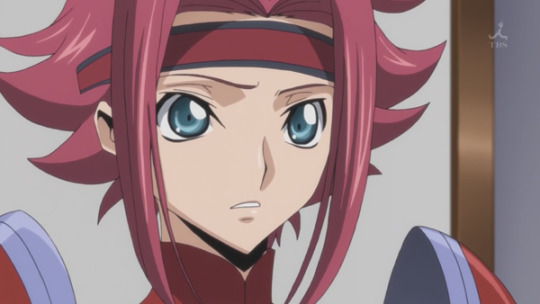
From early on in the series Kallen’s Se is quite apparent in terms of how she acts and thinks: she is very much practical and action-oriented and prefers to focus on issues in her immediate sphere of influence. This ability to quickly assess her surroundings and think on her feet is what makes her such a good soldier and pilot despite being a rather young member of the Black Knights. This is especially visible when Zero first contacts the resistance group: even though nothing is known about him, Kallen is one of the first to trust him, not because she necessarily sees him as trustworthy, but because she has a very good understanding of the situation she and her friends are in and therefore knows that listening to Zero’s advice may be their best chance to survive. However, Kallen’s improvisational combat skills are only the stereotyped tip of the iceberg that dominant Se actually is, so let us deconstruct some misconceptions.
In the MBTI community it is often assumed that types like INFPs, ENFJs and especially INFJs are by default “good at reading people”. The truth, of course, is quite different from that as well as much more complicated. While dominant Ni can provide a good understanding of other people’s thoughts by the means of reflection, Fe can have a good understanding of people’s social behaviour and Fi tends to be good at relating to people on a personal level, the process that we tend to imply under “reading people” is actually much more likely to be an attribute of dominant Se (especially with auxiliary Fi), and Kallen actually demonstrates that ability a lot. We see that from all the Black Knights she really is the only one to see subtle changes and details in Lelouch’s behaviour (both as himself and as Zero) and that is how she chooses to assess his and other people’s personalities and trustworthiness. To Kallen it’s not only important what people say, but also how they say it, to feel the meaning behind their words and see evidence to their claims. This is why it’s hard for her to believe that Lelouch had been using the Black Knights when he claims to have done so - it does not at all align with the person she has known him to be.
Another aspect of Kallen’s Se, mostly seen in her in relation to Lelouch and Gino, is that for her trust is gained through shared and proven experiences (Se as a whole primarily deals in experiences). It is why she starts off questioning Lelouch’s motives, but after having fought battles side by side with him, she trusts him in a way that could be considered more personal than that of a soldier - he has proven himself to her. Gino’s example is different, but also an interesting one: the two start off as enemies, and while Kallen at first sees him as nothing but an arrogant murderer, after he sees the consequences of Lelouch’s and Suzaku’s actions and is forced to reevaluate his own morality, she starts to actually understand and trust him, as she knows that his inner conflict and change for the better is genuine.
Auxiliary Introverted Feeling/Fi
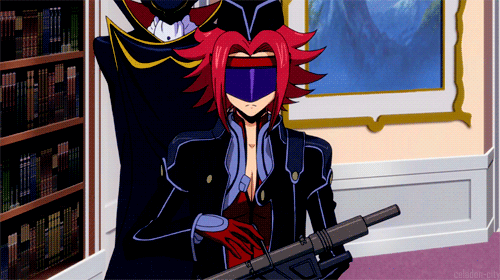
I talked a lot about how Kallen gains trust in other people when talking about her Se. Her Fi, however, is why trust matters so much to her to begin with. She will follow a competent leader that shows results, sure, but at the end of the day she will not feel safe as a follower until she knows that the one she is following can be personally trusted. And while she tends to see the Britannian nation as a whole as her enemy, we can still see that her anger and desire for revenge come from a much more personal place than a simple ethical argument. As was pointed out several times, Kallen would have had no difficulty just sticking to her Britannian roots, but she chooses to side with Japan specifically because Britannians are the people who killed her friends and especially her brother and who oppress those who don’t have the strength to resist them.
Compared to Fe, Fi concerns itself a lot more with how people should treat each other regardless of universal rule systems, meaning the part of morality that is unconditional and does not need to be agreed upon. This of course makes it a lot more personal to its user, as it is highly based on personal experiences and the conclusions drawn from them. This is exactly what makes Kallen’s shared Se experiences with people so essential to her, why her perception of them changes so much over time. However, unlike with an ISFP, it’s Kallen’s Fi that assists her Se and not the other way around. Being an auxiliary function, her Fi is what helps her find alternatives to solutions that aren’t quite straightforward to her, to stop and reflect when she can’t just trust her eyes. Because Kallen has quite a developed auxiliary function, she uses it in a healthy way, which makes her a good judge of character a lot of the time, knowing when others act in ways that don’t align with their usual judgement and being able to hold on to her sense of morality and faith in her friends at the most dire of moments. It is exactly this ability, that helps her get Lelouch back from his episode of desperation when Nunnally is revealed to be the new viceroy and what helps her understand Lelouch’s motivations after Zero Requiem has occurred.
Another interesting example to note here is the way in which Lelouch deceives Kallen that he isn’t Zero when they first start working together: he tricks both her Se and then her Fi by first using a fake phone call (providing factual evidence for Se) and later making a remark about how it’s more beneficial for the Japanese to obey Britannian rule (this solidifies the lie, as it completely contrasts with Kallen’s Fi perception of the kind of morally just leader that Zero is to her).
Tertiary Extroverted Thinking/Te

We actually see quite a bit of Kallen’s Te during the series, but it could be suggested that this frequent use of her tertiary is caused by her having to participate in a civil war - not the best place to make good decisions for your personal health and development. Te is essentially what Kallen resorts to when she gets angry, using it defensively: she doesn’t care about what her enemies reasons and motivations for fighting are if they chose the wrong side, instead oversimplifying and seeing most Britannians as simply evil (at least the Britannian military and ruling class). This is mostly to cover for the pain caused by the loss of her friends and brother, using those events to justify her anger. A very similar situation can be seen in regard to Kallen’s mother (more about her in the inferior section), whom Kallen resents and jumps to conclusions about because she is unable to understand her self-sacrificing behaviour. Both situations are eventually solved with a healthy use of Kallen’s Fi, as she allows herself to take time and understand others’ personal motivations instead of judging them just based on what she sees on the outside (Se-Te loop): first with her mother as she realises that she is solely motivated by her daughter’s well-being and later with Gino, when she sees and accepts the human side of some Britannian soldiers like himself.
On a smaller scale Te can help Kallen be a competent pilot and soldier, helping her understand Lelouch’s tactics to a degree, which solidifies her confidence in him, as well as being well disciplined and generally obedient in regards to orders for the sake of being a part of an organised military force. However, as shown with Lelouch’s deception example above, it is when Kallen is forced to rely on her Te that she is the easiest to trick and manipulate.
Inferior Introverted Intuition/Ni
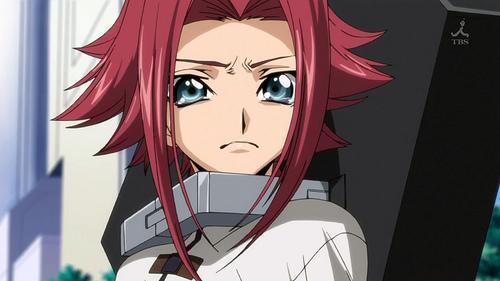
Kallen is a firm believer in actions speaking louder than words and certainly louder than reasons. For her no motivation or well developed theoretical argument, personal or otherwise, can justify doing something amoral or hurting people she cares about. This kind of mentality can at times cause her to misjudge people, whose motivations and personal beliefs aren’t obvious to her or are too well hidden for her to pick up on. Not being able to understand what someone is about causes a lot of fear and frustration in her, the best examples of that being her mother, Suzaku and Lelouch (repeatedly). The first causes her constant frustration and regret, because Kallen is unable to understand that her mother subjects herself to humiliation for her child’s sake, instead being confused and agitated by her “useless” behaviour until she actually overhears her mother talk under the effect of Refrain. Suzaku angers Kallen immensely, because to her he is constantly betraying his people and committing crimes agains them. The evidence speaks for itself to her and she once again completely misses his intentions.
Lelouch’s case is a bit more subtle, and seen especially well at the end of R1 and start of R2: we see that Kallen’s idea of Zero didn’t match the person he turned out to be, which she takes quite personally, as the realisation effectively betrays her expectations and the image of the fair leader she had in mind. When she says that she will “follow Zero, but not Lelouch”, she really means it, because her Se experiences with those two “different” people provide very conflicting evidence (made only worse by the fact that she was lied to by the person she trusted the most). This kind of naivety about the uncertain can be common amongst some developing or unhealthy Se-doms, but in the case of Kallen she manages to overcome it multiple times, seeing and accepting that there can be more to a person than their behaviour suggests.
However, please keep in mind that this is only my opinion on the matter and I will welcome any criticisms or alternative opinions to discuss them. If this article was interesting for you, stay prepared for next time, when I shall discuss the MBTI type of Kaname Ohgi.
#mbti#code geass#code geass mbti challenge#Kallen#kallen kozuki#ESFP#Se#Fi#Te#Ni#fictional characters
27 notes
·
View notes
Text
Code Geass MBTI Challenge Turn 01.04: Pizza Hut - ENTJ
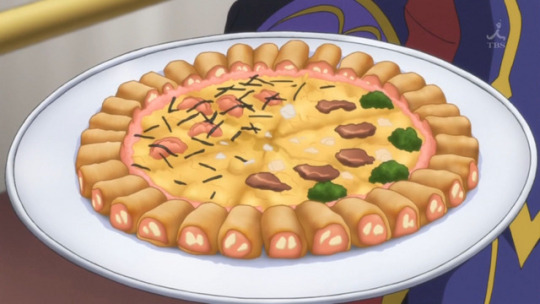
Over the course of this challenge we have thoroughly discussed a great many important and complex characters of Code Geass. We talked about Lelouch. We talked about Nunnally. We are waiting to talk about Suzasku, C.C. and many others... But for all the exciting and colourful characters we know and love, for all the soldiers, geniuses and highschoolers we like to discuss and reflect upon, there comes a time for us to think about the most controversial character our beloved anime has ever produced, the truly twisted puppet master who has been running the show from the shadows, the one who has been holding the world in the palm of their cardboard box... I am indeed talking about the great Pizza Hut and how they have influenced the whole world of Code Geass over the course of its run. SEVERE SPOILERS FOR ALL OF CODE GEASS AHEAD!
Now - let us dive into why Pizza Hut is an ENTJ.
Dominant Extroverted Thinking/Te

First and foremost, Pizza Hut is very outwardly oriented, skilfully dabbling in the rules of the world around them and focusing primarily on expanding their global influence. While I have seen many people type Pizza Hut as a Fe-dom, I would have to disagree however - the mechanism of thinking is different here. We can see throughout the series, that our glorious pizza company is utilising methods that are much more system-oriented than human-oriented: Pizza Hut does not operate in the realm of ethics or social rules (in fact avoiding any attempts to resort to methods such as public speaking), as much as they rely on a foolproof and systematic approach to achieve their goals - flawless customer service. In fact it has proven so reliable, that Pizza Hut has perfected this technique to the highest possible level: for all the times pizza was ordered during the show, how many times has it arrived late or found to be unsatisfactory by a customer? Not. A. Single. Time. This no-nonsense approach to business and marketing and dedication to their work has allowed Pizza Hut to quickly monopolise pizza production around the globe, eliminating any competition that would stand in their way.
Te also allows Pizza Hut to bee a good strategist when it comes to planning projects: they have a good understanding of Britannian politics and know exactly where to set up their base of operations without anyone noticing - the Ashford Academy, as evident by the shear amount of pizza ordered by its students and by Milly’s seemingly random ideas to create giant pizzas. Zero was indeed not the first mastermind to have the idea of setting up camp in Ashford...
Auxiliary Introverted Intuition/Ni

Pizza Hut’s Ni is an excellent tool they utilise, when they think that their standard business formula isn’t enough to solve a problem or needs to be improved upon. At the same time it is used at Pizza Hut’s most ambitious moments. We see examples of this when their Loyal minion Milly tries to enact Pizza Hut’s grand plans of creating giant pizzas to win the supports of many young students. While both attempts eventually fail, this shows a level of imagination and a desire to think outside the box that is indicative of auxiliary Ni.
Ni is also a function related to introspection and adapting perspectives. We see that, when Pizza Hut feels like it needs someone’s input or an alternative opinion to broaden their perspective in order to more effectively achieve their goals, they tend to listen in on their thoughtful conversations from students of Ashford Academy, knowing that their opinions can be trusted. Many great political strategies have been successfully “borrowed”, when a pizza was present during a conversation between Lelouch and C.C. for example...
Tertiary Extroverted Sensing/Se

We can see, that Pizza Hut’s Se has caused them to make a few slip-ups and careless mistakes over the course of the show, even if overall their grip on humanity still remains firm and strong to this day. The two failed attempts to create a superweapon giant pizza is, again, a good example here, as Pizza Hut’s excitement to put their project into being caused them to forget some of the details, resulting in failure due to factors that could have been otherwise easily foreseen. Another way, in which an unhealthy use of Se can be seen in Pizza Hut is their occasional impulsiveness, which is mainly directed at people who don’t buy their pizzas. Why do you think was Schneizel suddenly allowed to conquer the EU during R2? Have you even seen a single pizza in Akito the Exiled??? I didn’t think so!
Finally Pizza Hut’s tertiary Se makes them pay attention to aesthetics, sometimes valuing them greatly. While the most obvious example of this is the imaginative design of the pizzas, there are also other more subtle ones. You may have thought that Charles’ hair looks quite odd when first watching Code Geass, however everything becomes clear when you compare its shape to the also seemingly odd crust of the pizza seen throughout the show. Notice any similarities? Precisely! Charles zi Britannia is a loyal servant to his global and fashionable overlord...
Inferior Introverted Feeling/Fi

Many have described Code Geass as a story of brilliant tactics and strategies, of a mastermind who is always three steps ahead of everyone else, of an inspiring leader, who caught the attention of the whole world. While all of these things are true regarding Pizza Hut, I would like to emphasise the main development arc that this most complex character goes through: their understanding and acceptance of their human side (who would have expected that from a pizza company?!). This is most evident in their relationship with the inhabitants of Ashford Academy, as Pizza Hut starts of clearly just viewing them as disposable pawns, but growing more and more attached to them over time. While they never admitted it, Pizza Hut has always longed for a place to belong to, for people to accept them just the way they are, and their wishes have been fulfilled just by people enjoying them and having a good time.
While their struggle to accept their need for acceptance has been Pizza Hut’s biggest weakness, it was ultimately turned into their main source of personal growth, as they learned to accept their weaknesses and to open up (literally or not) to others. Truly, we can all be inspired by this tale of understanding oneself...
Happy April 1st everyone! Sorry for the slow flow of content, but I promise it’s coming along! So far I have had quite a bit of fun doing this. Did I actually just spend several hours contemplating the character and MBTI type of Pizza Hut? Indeed, but I regret nothing! Either way, I hope you enjoy what came out of it and I’ll see you all again as soon as I can with an analysis of Kyoshiro Tohdoh, so take care!
#mbti#code geass#code geass mbti challenge#Pizza#Pizza Hut#ENTJ#Te#Ni#Se#Fi#fictional pizza#happy April Fools
14 notes
·
View notes
Text
Exam season has ended!
Expect more frequent updates and typings soon...

4 notes
·
View notes
Text
Apologies to everyone for a slow release of content.
Having to deal with the exam period has made it a bit difficult for me to devote enough time to analyses to finish them within my usual release schedule, but I assure you that they're on their way.
My Tohdoh analysis is about halfway done and I hope to finish it somewhere around this week, as for future typings, I'll do what I can, but I unfortunately can't make any promises about how much I'll be able to release in the coming month.
After May is over though, I should be able to start releasing typings much more frequently.
Thank you for your patience!
6 notes
·
View notes
Text
A quick announcement about possible future list expansions.
So, much like the vast majority of the Code Geass fandom, I am also very aware of the new movie that's going to come out relatively soon, and regardless of how good or bad it turns out, the real question for my blog is: will there be new characters that I will be able to type?
Now, having seen all the trailers, I think it's fairly safe to say that the answer to that question is an almost definitive yes, because the only other alternatives would be to either make all of them really bland and two-dimensional or completely diverging attention away from them, which is unlikely considering how much they were hyped up in the trailers.
As you all probably noticed, my rate of content production isn't all too fast, so it is likely that my list won't be finished by the time I get a chance to actually see the movie. With that in mind, I would ideally like to make some new additions next to the "Akito the Exiled" characters. In short, what I am trying to say is:
GET READY FOR SOME MORE ADDITIONS TO OUR TYPING LIST!!!!!!

I shall see you all again soon(ish) with Ohgi 😉.
#code geass#mbti#code geass mbti challenge#fictional characters#code geass: fukkatsu no lelouch#code geass: lelouch of the resurrection#new characters#kaname ohgi
11 notes
·
View notes
Text
Code Geass MBTI Challenge Turn 5: Nina Einstein - INTP
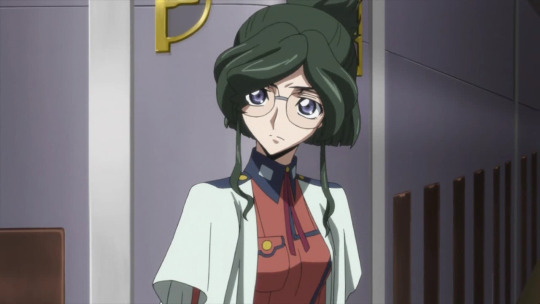
After this painfully long break from typing we finally return to a character, that the majority of the Code Geass fandom received also rather... painfully. Nina Einstein has never exactly been a popular character in the community, however her mindset as well as her journey throughout the series are still very interesting to explore. This also carries over into her MBTI profile, as she is rather unique, and a version of an INTP that we don’t see in fiction all that often (mostly because she is so monstrously unhealthy). Before I start explaining this character’s functions, please keep in mind, that this post will contain heavy Code Geass spoilers, so consider yourself warned. With that out of the way, let us analyse why Nina Einstein is an INTP.
Dominant Introverted Thinking/Ti
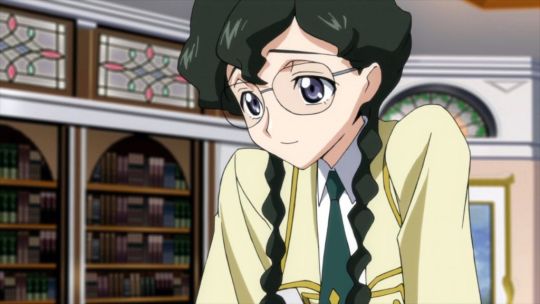
As a dominant function Ti is very unique and often misunderstood, as questions asking to differentiate it from Te arise a lot in MBTI-related conversations (to me at least), mostly because when people try to understand thinking functions, they tend to relate it to cold rational logic by default, and thus the line between Te and Ti becomes blurry. While both functions do revolve around logic, the types of logic represented by each are quite different. Compared to Te’s conceptual, rational and objectively applicable logic, Ti is concerned with logic that is situational and is therefore much more subjective as well as specialist. For a Ti-dominant this means that they excel at understanding topics that are of personal interest or importance to them and are reluctant to approach topics which don’t fit into those categories.
Nina herself is a perfect example of this: to most people she appears as shy, insecure and even somewhat incompetent, and indeed she is in regards to mundane or social aspects of her life, which she has little experience with, despite being a smart girl, however this changes completely when she is working on something she specialises in, such as engineering. She actually shows a visible change of character, seeming more confident, determined and innovative. It is no wonder that Lloyd instantly recognised her intellectual capabilities, when he first found her working on a science project - as an experienced scientist himself he can easily spot someone who is exceptionally competent in his field (and she really is for her age). The same can be said for Lelouch and Schneizel, who see Nina’s potential as a scientist and get the most use out of her by playing to her passions and giving her personal motivation, often referring to Euphy’s death as a way to encourage her to work harder. This kind of difference in confidence and expertise between subjects that are personally relevant and those that aren’t is an important trait of a Ti-dom and often a good way to recognise one. In our case, Nina confidently ticks this box.
Auxiliary Extroverted Intuition/Ne
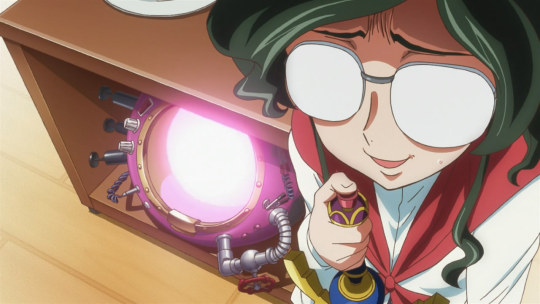
In an anime consisting predominantly of unhealthy individuals Nina (along with Suzaku) holds a very impressive position of being one of if not the most unhealthy one. Throughout most of CG’s story we see Nina struggling with states of looping and gripping, meaning that her auxiliary function is not properly developed or used in a healthy way. In fact Nina’s character arc has a lot to do with learning to use her Ne: she starts off as close-minded and reluctant to listen to other people’s perspectives on her problems and she only snaps out of her tunnel-visioned quest for revenge after she personally witnesses the devastating consequences of the weapon she created. This breaking point finally makes Nina see her past way of thinking as an unhealthy one and start working towards fixing the problems she has caused as well as making sure to become a balanced enough person to never again slip into a state of apathy towards hurting innocents.
In the last few episodes of R2 we see Nina being much more open towards other people’s perspectives, such as Milly and even Lelouch - the person she hated more than anyone else. This development shows a healthy use of auxiliary Ne - one that uses associative thinking and external perspectives in a way that helps the user grow as a person instead of using them defensively to validate the user’s insecurities and fears.
Tertiary Introverted Sensing/Si
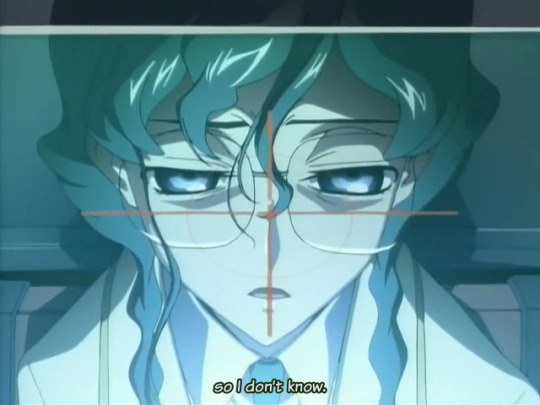
Nina’s Ti-Si looping behaviour is very active throughout most of CG and ends up causing many problems for both Nina and those who surround her. As stated above, she starts off with her auxiliary being underdeveloped, causing her to feel extremely uncomfortable when having to confront issues outside her comfort zone, so she instead sticks to what she is familiar with in ways that hinder her personal development and can therefore be described as unhealthy (Si loop).
A good example of this is her initial racism towards the Japanese and her resulting confusion at Suzaku attending Ashford Academy: Nina doesn’t really have a reason for distrusting the Japanese, but her lack of confidence in trying to rationally consider a subject she usually doesn’t have to deal with is a scary prospect to her, especially since a strong position on Japanese rights already exists in her society, so she instead takes the easy way out, taking what she’s been told for granted. Nina’s Si also causes her to go into her tunnel-vision-revenge-mode, only focusing on the details of how to kill Zero without considering the consequences of her actions. Her perspective on both issues is reevaluated, of course, once she breaks out of her loop and starts developing her Ne, but not before Schneizel uses her for a good while by validating both her Ti-Si loop and her Fe-grip (more on that below). By the time Nina sees the wrong in her ways, a lot of damage has already been done to her as well as countless innocents.
Inferior Extroverted Feeling/Fe

The inferior function signifies the aspect of an individual’s personality that they have the least control over and that they can derive their strongest insecurities from, and boy does Nina Einstein fit both of these criteria. The social aspect of Nina’s life is indeed the one, which she feels the most lost, confused and insecure in for several reasons: when Nina confronts Euphemia, it is revealed that she experiences a lot of self-hate and shame, in part due to her feelings towards the princess (it could very well be argued that Britannia’s restrictive society had a big part to play in that issue). While Euphemia’s response to comfort and encourage Nina is a natural and humane one, this sudden bit of positive reinforcement from the person she loves the most causes Nina to enter into a Fe-grip, developing an obsession with Euphy as her only and “true” source of validation, which in fact goes so far, that she refuses to accept personal encouragement from anyone else in later episodes, viewing Milly’s support as condescending and non-genuine. Even Schneizel has to win Nina over by talking about what she could do “for Euphy” and “what Euphy would have wanted”. By the end of CG, however, Nina breaks free from her grip and starts becoming more independent as a person and finding self-worth without the need for external validation.
However, please keep in mind that this is only my opinion on the matter and I will welcome any criticisms or alternative opinions to discuss them. If this article was interesting for you, stay prepared for next time, when I shall discuss the MBTI type of Rolo Lamperouge.
16 notes
·
View notes
Text
Code Geass MBTI Challenge Turn 8: Kaname Ohgi - ISFJ

What I like about typing Si-doms and ISFJs in particular in fiction is that, for some reason, all of their functions fit together very clearly together and are quite handy to analyse. Kaname Ohgi is no exception here, as he shows a whole lot of clearly definable function interactions, despite being a secondary character. While his character arc isn’t grand or epic in its scale, it still remains important to the story, as Ohgi’s character contrasts that of more prominent characters like Lelouch, Suzaku or Charles even more so than Kallen. Before I start explaining this character’s functions, please keep in mind, that this post will contain heavy Code Geass spoilers, so consider yourselves warned. With that out of the way, let us analyse why Kaname Ohgi is an ISFJ.
Dominant Introverted Sensing/Si

Dominant Si is a very interesting function, in that it is specialist, but in a very different way compared to a function like Ti (which actually enhances that aspect in ISFJs as a tertiary function): for a Si-dom there are always certain subjects or pieces of factual information that are very personal to them and which play an important role in the user’s sense of identity. In unhealthy Si-doms this kind of thinking can make them very rigid and biased without properly using their auxiliary to rationalise (some ISXJ stereotypes stem from this), however more healthy Si-users tend to use this mindset to their advantage, making them very grounded and methodical, as they are able to keep true to their principles while also seeing the rationale behind said principles. Ohgi tends to display much more of the latter than the former, being pretty healthy overall.
For Ohgi his dominant Si is primarily represented by Japanese culture and the values and factual information that he associates with it. We actually see him at his most excited and happy when he is allowed to show others what Japanese culture is all about (mostly seen with Villetta when she loses her memory) or to think about the future that the Black Knights are working to build. While he strongly cares about the rebellion and its success, we also see that participating in this uprising is not something he enjoys, only seeing it as unavoidable means to an end - he does what he can for his fellow rebels, but at the end of the day he is also always contemplating his place in this world due to Si’s introverted (in the MBTI sense internally focused) nature, whether that applies to the Black Knight movement or to Japan after its liberation. This doesn’t mean that he is selfish, quite the opposite in fact, but for him social connections aren’t the main way to find the answers he is seeking in life, meaning that he relies on a personal system of principles first (Si) and on commonly accepted values second (Fe).
However, while Ohgi may find it important to introspect when making important decisions, he doesn’t do so to an extreme (something Ni-doms especially can get trapped in if unhealthy) and generally remains grounded and calm in tense situations. His Si (and to a lesser extent his Ti) is again something that makes him both a decent leader when it comes to small-scale operations (as seen at the start of R1) and a very competent assistant to Lelouch later on in the series. Si’s primary method of functioning is to identify and organise facts that it deems as relevant (this relevance is then based on the user’s personal system of principles as well as lower functions), which means that when this input of information is controlled, Si can be easier to use effectively. In a way it is one of the best functions to “think inside the box”. While this has never been pointed out directly, it could be argued, that Ohgi’s effectiveness as an officer is boosted by performing a specific function in Zero’s army, thereby essentially being protected from being overwhelmed by information (Ne). This once again would speak to Lelouch’s ability to know how to use someone in the most effective way possible.
Finally, Ohgi’s Si is also the reason why he ends up pursuing a relationship with Villetta. Unlike ESFJs, who live in the world of social connections as a whole, ISFJs prefer to focus on very specific social roles and connections and we can see this in Ohgi, as he struggles to balance between the values presented by the Black Knights (also known to some as as “Britannians are evil”) and his own thoughts on how a defenceless human being should be treated. Ultimately it’s more natural for Ohgi to go with his Si first and save Villetta rather than leave her to die (not to suggest that an ESFJ wouldn’t go through a similar dilemma, it’s just that for Ohgi the decision to do the right thing is based on personal Si principals primarily).
Auxiliary Extroverted Feeling/Fe

Ohgi’s relationship with Villetta allows us to comfortably transition from his Si to his Fe. As the two gradually grow closer, it could be said that Villetta becomes a part of what’s personally important for Ohgi and hence gains relevance for his Si. While it may not be a conscious realisation on his part, this makes Ohgi want to show her the beauty of the world and specifically Japanese culture from his perspective, to integrate her into his Si in a sense. The way Ohgi goes about doing that is through his Fe, but because the function is auxiliary, this means that it is used as a way and a need to express to others (specifically those who are close to him) what is personal to him because of his dominant Si.
Fe is a function that not only has a human focus (which in general is a requirement for feeling functions) but also a social one. This means that a high Fe user’s sense of morality exists primarily as a reaction to a social group or groups they interact with (meaning that it doesn’t have to agree with its social group’s values, but that these values always remain relevant to either agree or disagree with). Ohgi himself struggles with the rules of his society (the Black Knights) over the course of the series, as his loyalty to the uprising is compromised by his feelings for Villetta. Seeing how character arcs in fiction often revolve around a given character learning to accept and use their auxiliary function, it is quite fitting, that Ohgi’s development largely deals with him finding a balance between his personal sense of what’s right and his desire to be loyal to his friends and his organisation. His attempt to negotiate with Villetta and convince her to defect the Black Knights in R2 is actually a very Fe way of solving this problem: he finds a way to be with Villetta without upsetting the social order of the Black Knights and uses his understanding of this social order to reach it (for example knowing that someone like Diethard was able to join without facing any consequences, which shows cooperation between factual Si and social Fe).
Not being Fe-dominant, Ohgi also doesn’t prioritise his position in his society: he plays the roles of both leader and follower with equal enthusiasm, as it is more important for him to be helpful than to occupy any specific role in the social system of the Black Knights, and receiving credit for his actions doesn’t seem to be a concern for him either (not all ISFJs share this notion, as we shall see in later characters, but this can be a sign of auxiliary Fe in healthy users). This, however, doesn’t diminish his faith in his friends, as Ohgi’s Si-Fe dynamic allows for him to remain both practical and idealistic and be able to keep the organisation stable when Zero is not available (his frequent arguments with Diethard’s ambitious ideas are evidence of that).
Tertiary Introverted Thinking/Ti

Ohgi has much fewer unhealthy moments than the rest of the CG cast and can therefore often be seen utilising his Ti in useful ways when he needs to do so. This, for example, makes him a decent military leader, especially while acting under Zero’s guidance. This allows him to focus purely on the battle at hand and acts as a kind of way to direct his structured Si thinking. In more unhealthy Ti-terts this can lead to tunnel vision, but Ohgi can usually stick to his Si and Ti to remain stable even when he doesn’t have a grasp of the whole situation, which is why Zero sees him as a valuable subordinate.
Another way in which Ohgi’s Ti is expressed is in his previously mentioned pursuit of his personal Si passions. Ti is a function that deals in logic specific to topics relevant to its user, meaning that the Si-Ti dynamic allows an ISFJ to double down on those Si topics they find relevant on a personal level and become experienced in understanding them. On one hand, we see this interaction come to light in quite a harmless way, making Ohgi something of a Japanese culture nerd when he is allowed to (even coming up with a Japanese name for Villetta). On the other hand however, his eventual conflict between his personal interests and the interests of the Black Knights send Ohgi into a temporary loop when dealing with Villetta: his fear to endanger her or expose her identity cause him to make rash decisions without properly considering the consequences of his actions. This obsession with safeguarding someone close to him shifts his priorities in a way that hinders the Black Knights and ultimately results in Villetta taking advantage of that state after she regains her memory at the end of R1. It is no surprise that we see Ohgi being a lot more careful in R2, though being quite healthy and reasonable he doesn’t seem to hold a grudge against Villetta for her “betrayal” and understands where she is coming from by using his Fe and not his Ti impulses.
Inferior Extroverted Intuition/Ne

Being a Si-dominant, Ohgi feels comfortable when dealing with specifics and certainties. He is good at understanding of the system he is following and good at acting out well-planned operations, remaining consistently reliable. However, like many Ne-inferiors, Ohgi is also prone to missing the forest for the trees and often fails to understand Zero’s full intentions behind the plans he has him carry out. By no means does this imply that Ohgi is unintelligent, but his way of thinking is naturally focused on the details rather than the big picture. Grand and abstract goals just aren’t something he sees as relevant to consider before the necessary work is done. He does not deal specifically in the future, present or past, but in what is tangible (the nature of dominant Si) and his hopes for what’s to come are separate from his decision making.
Ohgi’s inferior Ne manifests both as a healthy filter for irrational ideas and as his greatest weakness. The first is most commonly seen when he is butting heads with Diethard, keeping things grounded and staying true to his principles while the former journalist theorises in ways that seem much more cold and unreasonable to Ohgi. An eccentric idea just isn’t worth pursuing if it goes against one’s principles. However, Ohgi’s poor understanding of big picture connections and associative thinking that make up Ne often make it easy for other people to manipulate him. He is so focused on sticking to what he knows and being weary of the unknown, that he is completely fooled by Lelouch acting as an evil dictator and does not consider that Schneizel may be using the Black Knights to achieve his own goals (by comparison, a Se-dom like Kallen was harder to fool in this situation, because she relies more on what she sees than what she knows).
However, it could also be said that neither these examples speak to an unhealthy use of Ohgi’s inferior: both because the princes are exceptionally deceptive and devious and because we haven’t really seen the young revolutionary in the state of a grip (good job, Ohgi!). In the end Ohgi is just a simple man trying to survive in a crazy and ever changing world and even as his polar opposite Diethard thought, that was exactly the kind of person the Black Knights needed.
However, please keep in mind that this is only my opinion on the matter and I will welcome any criticisms or alternative opinions to discuss them. If this article was interesting for you, stay prepared for next time, when I shall discuss the MBTI type of Kyoshirou Tohdoh.
6 notes
·
View notes
Text
List of links to typed Code Geass characters (Code Geass MBTI challenge).
1. Lelouch vi Britannia
2. Nunnally vi Britannia
3. Shirley Fenette
4. Milly Ashford
5. Nina Einstein
6. Rolo Lamperouge
7. Kallen Kōzuki
8. Kaname Ohgi
9. Kyoshiro Tohdoh
10. Diethard Ried
Note: This is an unfinished list and it shall expand as I type more characters.
#code geass mbti challenge#code geass#fictional characters#mbti#list#character links#Ni#Fe#Ti#Se#Ne#Fi#Te#Si
10 notes
·
View notes
Note
Wow your MBTI typings are really impressive! You’ve managed to convince me on every one of your typings so far, with one exception. Have you considered ENFJ for Nunnally? This might get long, I apologize. Let’s tackle NeSi first. I definitely agree that she is an intuitive, but I don’t see the out of the box creative thinking that you get with say, Milly. Rather, she has a single vision, “a kind world” which is more of a Ni thing. 1/?
Continued: I agree that Si really isn’t evident. But I would argue she compensates for being blind and crippled by developing Se in the other senses. She has excellent hearing, sense of smell and a near magical ability to sense emotion by touch. In terms of Fe vs Fi, values conforming to society is more of a Si thing, I find. But she is extraordinarily people and relationship focused. She wants the people in her life (Lelouch, Suzaku, etc.) to get along.
Remember how Lelouch said Nunnally’s smile is for other people’s sake? That’s a very Fe kind of “hiding your own feelings to ensure harmony” thing to do. Ni is subordinate to Fe, in that the point of having a kind world is so people can live together peacefully. She only brings it up because Lelouch asks. She sincerely believes it but it’s not her top priority compared to living with her brother, and she told him as much at the end.
As for extroversion, again her disability and position do restrict her social life. She does make friends very easily and is shown to enjoy social interaction. As well, she doesn’t want to be a burden socially on the student council, which again shows other people’s needs > her needs. Lastly, objecting to a coldly rational way of doing things is more inferior Ti. She rejects it precisely because spending time in her inferior function is uncomfortable. 4/4 Thanks for reading

Great question, anon, and a good opportunity to bring up Fe vs Fi! Both functions have a moral and human focus, but in quite different ways.
Fe is an extroverted judging function, hence, having an outward focus makes it a lot more rational in its approach to morals (sometimes in fact being very similar to Te in that aspect). The main thing that separates Fe from Fi, is that the morals of a high Fe-user always exist as a reaction to the values of their respective society (society in this case is quite a broad term that can imply both society as a whole as well as one’s social group of close friends, depending on the person): they always exist on a scale from agreeing to disagreeing with them and hence are often concerned with values that affect this given society. A Fe-dom in particular also perceives themselves through the role they play in their society. Take Shirley as an example: the relationships she is in are very much the main component of her life and the one that she has standards for. She cares about Lelouch’s physical and emotional well-being and her relationship with him, but she doesn’t really try to understand him as a person until R2 comes along.
Comparing that to Fi, the values supported by this function originate independently from societal values (again remember that “society” is talking pretty broad here) and rely on the Fi-dom’s personal experiences and the conclusions drawn from these experiences. This doesn’t mean that a Fi-user cannot agree or disagree with societal values, but the focus of Fi morals is a personal and human one, focusing much more on what people believe than what they do and often prefers not to be restricted by social systems in favor of human values that are much more subjective to the user.
We see that Nunnally’s values originated independently from any society she could have been a part of: they don’t come from either Lelouch or Suzaku, nor did they originate as a reaction to Britannia’s value system. She finds racism towards the Japanese to be unethical of course, but she’s much more prone to judging people on a case-by-case basis, which also explains why she is willing to fight Lelouch and Suzaku at the end of R2: not only have they personally deceived her, but in her eyes they also have abandoned their personal morals to achieve theirs goals. Her Fi is also why her final challenge for Lelouch is giving him a choice to use Geass on her - it’s a test of Lelouch as a person, as if she’s asking “Have you, my brother, fallen so low as a human being that you would enslave and use me, your sister, whom you knew for your whole life? The brother I know would never even think about doing such a thing.” It also helps her understand what Lelouch was actually trying to do at the end of the story and ultimately forgive him (the same goes for Euphy, Nunnally just recognizes that her actions didn’t fit her nature without even needing evidence for it). To a Fe-don in her position this kind of opinion would likely seem biased and unfair, based on what Lelouch did ass opposed to who he was as a person.
You also bring up the possibility of auxiliary Ni, however we have to remember that it is quite different from Ni as a dominant function: for an ENFJ Ni is used to think of ways to improve upon the current state of the society important to them, questioning the parts of it that may seem flawed to the user. We see that Nunnally doesn’t tend to go through this process, for her, she knows how she believes people should treat each other based on her Fi values, once they do society will essentially fix itself due to the nature of human kindness (from her perspective). We do see her use her Ne however to understand which part of her Fi is realistically applicable to the world around her: when addressing the Japanese people she’s trying to appeal to their personal human values, yes, but her Ne also helps her understand that after the ways in which they’ve been hurt they will need a lot of convincing before they agree to anything, hence why she also uses highly personal gestures to make the Japanese trust her.
(I would also quickly like to note, that behavior is not really type-dependent, but rather thinking is, hence many stereotypical MBTI behaviors such as being shy/outgoing or easily making friends can often be a trait of a member of any type)
I hope that this answered your question, but in case you’ll need more comparisons, I can assure you that more Fe-doms and Fi-doms are to come in the future as a frame of reference. In the meantime, I hope you enjoy my slow output of content!
11 notes
·
View notes
Text
This blog is not dead!!!
First of all, I would like to once again apologise to the people who read my analyses for the lack of any content in the past several months, but, well, life happens sometimes, and unfortunately uni is a part of life that keeps you pretty damn busy. It didn’t exactly help, that both my drafts for typing Nina got deleted due to my laptop working against me (apparently), so even my attempts to return to typing have been stopped so far. However, I still always wanted to continue with my original plan today I’m here to announce to you, that this blog is indeed being revived!
While i probably won’t be able to write daily as I first wanted to, there will still be relatively regular posts, and Nina Einstein’s analysis specifically should also come out somewhere within this week. I still fully intend to complete my Code Geass MBTI Challenge, and already have plans for other anime to follow.
If any of you loyal and/or curious readers are still out there, prepare yourselves! I am still here to entertain you and have fun with you)
You shall see me again soon. Plague Amon out 😉
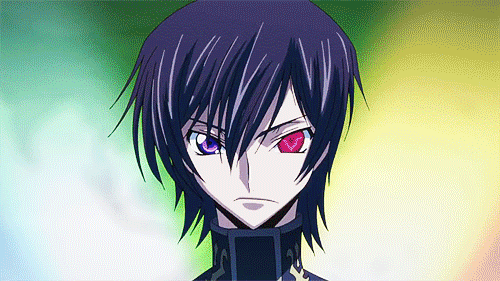
#Blog relaunch#code geass#code geass challenge#code geass mbti challenge#mbti#fictional characters#analysis#anime
5 notes
·
View notes
Text
Yet another message to my readers (hopefully the last one in that format).
I apologize to everyone reading my Code Geass MBTI Challenge series for such a long delay on Nina's MBTI analysis. I was hoping to finish it a lot sooner, but it turns out a lot of things came up for me to do irl, so I had to postpone the typing once again. Please don't think, however, that I'm stopping my series or have forgotten about it! It is a temporary delay, that will hopefully last no longer than a week, and I plan to see this challenge through and continue with other shows after Code Geass. With that said, I'm grateful for your patience and hope to continue soon!
24 notes
·
View notes
Text
Code Geass MBTI Challenge Turn 4: Milly Ashford - ENTP

What I like about typing Ashford Academy characters is that it gives us an opportunity to view MBTI types in a casual social setting. Considering that Code Geass is otherwise filled with plotting masterminds, raging cyborgs and immortal beings, one could argue that this high school may be the closest setting we have to real life, and thus breaking down MBTI stereotypes for Ashford Academy characters is even more important. Milly Ashford herself is a pretty good example of that - she is not the first person to come to mind when reading the ENTP description on 16personalities (may that site burn in hell), yet her type is quite apparent when you actually consider how she uses her functions. Before I start explaining this character’s functions, please keep in mind, that this post will contain heavy Code Geass spoilers, so consider yourself warned. With that out of the way, let us analyse why Milly Ashford is an ENTP.
Dominant Extraverted Intuition/Ne

Milly’s primary drive in everything she does throughout the series is her curiosity. In the Code Geass MBTI community I have seen Milly often typed as a Fe-dom, because of how involved she is in her school life. However, her main investment in her school community doesn’t come from a need to maintain or improve its social aspect or even be all too active in it, but to satisfy her curiosity and boredom. We see that Milly takes a big interest in almost all characters we see her interact with. Part of it is because she genuinely cares about some of them, but her main motivation is to know how they work. Ne-dominants try to consider all apparent aspects of whatever they are directing their attention towards as well as the world in general. The stereotype of Ne-doms being “quirky” therefore comes from the fact, that a part of the information they consider can appear unorthodox to others and is therefore more memorable. We can see that with Milly in how she pays attention to people’s secrets or information they sometimes find inappropriate, poking and teasing people to find out more about them. This kind of information doesn’t actually hold a special importance for her, it’s just that from her perspective you need to consider everything about a person in order to understand them.
Ne is a function that relies on making theoretical connections between various pieces of information, making Milly also an inventive problem solver (combined with her Ti), resulting in weird events, which involve the whole school, but are somehow pretty effective (at least in her mind). Being Ne-dominant, Milly also strives for novelty and excitement - another reason for all the extravagant events she organises and possibly for why all of her arranged marriages fail - the prospect isn’t in any way exciting for her in general, and it takes time for her to realise that the problem lies with the idea of an arranged marriage, not just individual candidates.
Auxiliary Introverted Thinking/Ti

As is common for ENTPs, Milly has an experimental mindset. This is due to how her Ne-Ti dynamic works: Ti revolves around situational logic, meaning that, whenever Milly wants to get a result or a piece of information, the easiest solution for her is to learn from or within specific situations. In Milly’s specific case she prefers to set up situations herself: whenever she sets an objective for herself, like finding Lelouch’s mask, setting up Lelouch and Shirley as a couple or just learning more about her fellow students, she uses her Ne-Ti imagination to set up her aformentioned events and games, where she can make up her own Ti rules, which make sense to her. Perhaps it woudl be a more rational idea to just talk to Lelouch and Shirley about how they feel, for example, but involving the whole school in a game where students hunt their crushes and trade hats with them would be a lot more effective, because Milly understands how to get the results she wants under these conditions. Rules are only as good as the extent to which someone can use them to solve a specific problem.
So, while Milly primarily works with the external world in a theoretical manner (Ne), the logic of her approach is still very subjective to her and may seem unusual to others because of that (Ti).
Tertiary Extraverted Feeling/Fe

As I said before, Milly’s Fe is a function people often mistake for her dominant. This is due to her upbringing. Because Milly grew up in an environment with a strong focus on society, etiquette and status, she possesses a lot of social knowledge, but she doesn’t really care as much for the social aspects of her life, as a Fe-dom would. Again, this is visible in how she really isn’y interested in her arranged marriages or even her social status. Sure, she initially thinks, that all those things are important to her, because she cares about her family, but eventually she realises, that this sort of life isn’t at all what she wants; she would prefer something to actually interest her Ne. Meeting a free soul like Lloyd actually helps her to realise that her desires are independent from her family’s. One could argue, that Milly is an example of a Ne-Fe loop induced by her upbringing.
However, because her Fe is being used so much initially, this also gives her a people focus in terms of what she chooses to focus her Ne interests on, making her knowledgeable on and helpful to all her friends quite often. Milly’s Fe can also be seen in her ethical standards, as, while she is greedy for people’s secrets, she would never actually betray them and prefers to only play around with the idea in her usual Ne way.
Inferior Introverted Sensing/Si

Inferior functions are always fun to talk about in fictional characters, because they are usually related to their most important inner struggles. Milly is quite an interesting case, as while she enjoys all the fun and “experiments” she organises in school and school life in general, she fears that there’s nothing actually stable and reliable in her life, causing her to question whether her lifestyle was the right path to begin with. So while Nina’s accusation of Milly being shallow wasn’t exactly constructive (oh goodie, Nina’s next, isn’t she?), Milly still takes it as a valid criticism and prefers to learn from it, being a rather healthy ENTP. In the end her moving on from her school life to a job satisfied her Si-fears, allowing her to further develop and mature as a person.
However, please keep in mind that this is only my opinion on the matter and I will welcome any criticisms or alternative opinions to discuss them. If this article was interesting for you, stay prepared for next time, when I shall discuss the MBTI type of Nina Einstein.
#mbti#code geass#code geass mbti challenge#milly#milly ashford#entp#Ne#Ti#Fe#Si#fictional characters
23 notes
·
View notes